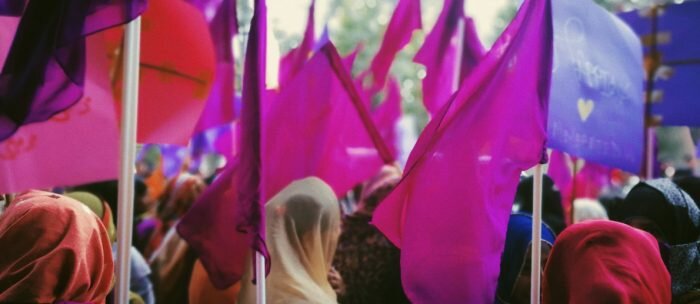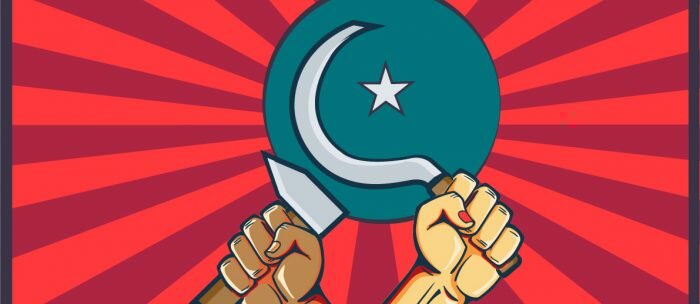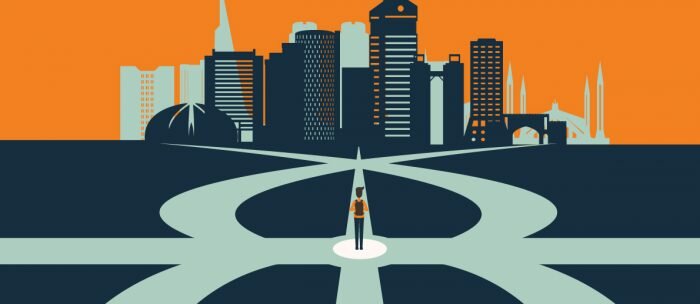
One Khokha, One Thousand Lives
Why then is the CDA so adamant to shut down Islamabad's khokhas?
In June 2019, the CDA, during an anti-encroachment drive in the city, bulldozed over a 102 licensed khokhas without notice. The khokha owners of Islamabad are now combating CDA in Islamabad High Court for the right to operate their licenced stalls.
Sharafat Ali, a 30-year-old clerk, eats three meals a day from a khokha in F 10 / 3 Market, Islamabad. “I like their sabzi and keema. They give me an additional discount because I eat here daily,” says Ali.
There are 485 licensed khokhas within the municipal limits of Islamabad, this number comes directly from the Capital Development Authority (CDA). People like Ali have their daily meals at these roadside khokha because it is an affordable alternative to established restaurants.
But in June 2019, the CDA, during an anti-encroachment drive in the city, bulldozed over 102 licensed khokhas without notice. Now, roughly 120 khokha owners have come together to combat the CDA in Islamabad High Court for the right to operate their licenced stalls.
In many cases, the owners’ belongings were still inside. “They bring big machines, break things and leave. They do not give us any warnings, they do not give us an alternative,” says Ahmed Sultan, whose khokha is located within the parking area of Deputy Commissioner Islamabad’s office. It was demolished in June 2019, he salvaged whatever he could and is once again operating his stall in the same location.
The fact that he can continue to run his once- demolished khokha in the DC office’s parking lot says a lot about the murkiness around the anti-encroachment drive.
According to the CDA, these 485 licensed khokhas are “shabby and ugly structures” which were given temporary licenses to operate so that they could feed communities while the city’s Markaz (s) developed. The CDA believes they are no longer needed since Islamabad has developed into a functioning city.
The people of Islamabad beg to differ.
Soch compared rates of one tea, a single roti, one plate of daal/sabzi and one plate of chicken/meat at a regular restaurant and a khokha. While roti is served at a uniform rate at about Rs8, tea at a khokha costs Rs20 to 25 compared to a regular restaurant where it costs between Rs50 to 250. A plate of daal/sabzi is for Rs50 at a khokha and no less than Rs150 at a restaurant. And the portions at restaurants are abysmally small. “It does not even fill your stomach and you have to order several plates,” says Ali.
Ali still spends Rs8,000 monthly at the khokha, out of his salary of Rs21,000, the rest of which he sends home to his family in Naran. “I have two daughters and eight other family members I have to take care of,” he says. If he was to eat three times a day at a regular restaurant, he would hardly have anything left over to send home.
These khokhas provide the poor with affordable food, and they are also licensed and legal. Then why is the CDA so adamant to shut them down?
Islamabad, the Khokhas and the CDA: A History

In 1978, the Secretary of Housing and Works, Islamabad issued licenses to the city’s khokha-walas, who were aiding the development of the city by providing food for the labour force. By 1986 a separate government policy was issued for the khokhas: “Policy Regarding Location of Cabin Shops, Kiosks, Tea Stalls and Temporary Structures in Islamabad”. Under this, the CDA streamlined the process for issuance of licenses to three distinct categories of khokhas:
1. In developing sectors: Due to the time it takes for the development of proper markets in a developing sector, temporary kiosks are set up as an interim arrangement for residents of the area.
2. Along peripheral service road of sectors and Highways in the urban area: due to the community-oriented nature of bazaars and Markaz in the planning of Islamabad, peripheral roads are left with no markets. So small kiosks are made for travellers for their petty shopping.
3. In parks and recreational areas: for remote interesting points, small kiosks be made for shopping, drinks, and snacks.”
Over the years, hundreds of licenses were issued after applications for allotment of khokhas were invited from the general public. In 2000, the CDA collaborated with khokha owners to make their khokhas aesthetically pleasing since they “represented organic development which caters to the needs of the people of the city of Islamabad”.
By 2009, according to the CDA, there were 235 licensed khokhas in the city.
But in 2011, the CDA banned allotment of new khokhas until a fresh policy was drafted because they believed there was a lack of transparency in the allotment mechanism.
“By law, the CDA has to advertise that they are giving out so and so number of licenses for khokhas in the city,” says Umer Gilani, Advocate High Court who is representing one of the licensed khokhas in court. While explaining the allotment mechanism, he adds: “Whether the CDA followed its own procedures does not concern the licensees. It is the government’s internal procedures. The licensee entered into a bona fide deal and therefore have legitimate expectation that they will be allowed to continue functioning for as long as they abide by terms of license”.
“The issue began under the supervision of Director Mansoor Ali Khan of the Directorate of Municipal Administration (DMA),” says a CDA official who chooses to remain anonymous. “Khan gave licenses to khokha and jhopriwalas and allotted land. He did that without planning out how these licenses would affect the city, just so that he could eat off the licenses and show progress in his department,” says the CDA official. According to the official, Khan issued 355 licences in his tenure between 2009 to 2012. Khan has also been accused of other illegal allotments by a former CDA chairman.
In late 2012, Islamabad High Court temporarily banned permission for new leases/license regarding use of CDA land.
“It is important to note that the recommendation did not mention khokhas,” says Gilani. “In 2013, CDA acted on what is thought was the court’s orders, cancelled the licenses of all khokhas, thus putting them at risk of demolition.”
Illegal, Despite a License
According to statistics presented by the Mayor in the High Court, only 250 licenses were given after 2009. Islamabad currently recognises that it has licensed 485 khokhas. The Mayor made a bold claim in the High Court that there were more than 2,000 khokhas operating illegally in the city, but was unable to provide any evidence for this claim which seems exaggerated.
This is not the first time that the axe has fallen on the khokhas. In 2015, around 200 khokhas were demolished by the CDA during an anti-encroachment drive. These were the khokhas whose licences CDA had cancelled in 2013. The National Assembly took notice of the anti-khokha drive and issued recommendations to the CDA to renew and restore all 485 khokhas licenses, formulate a policy to differentiate between legal and illegal khokhas and act against the latter.
Later the CDA issued “The 2016 Policy” for the khokhas. Rents were increased from Rs450 to Rs3,000. Khokha owners were willing to pay the fees, as long as they were allowed to operate.
In 2017, Metropolitan Corporation Islamabad (MCI) was set up. The powers of the municipal administration of Islamabad earlier vested in the CDA were transferred to MCI. Hence, the question of whether to renew the khokha licenses and to issue further licenses was also handed to MCI. In the same year, the MCI adopted a detailed resolution in favour of the khokhas: “The 485 licenses khokhas should be restored so that the citizens of Islamabad may be able to benefit from their services and so that poor people may also be able to get employment opportunity.”
“The CDA, however, refused to comply with the decision of the MCI for various reasons which had no basis in the law or the Constitution,” says advocate Gilani.
“My license was renewed in 2017-2018 and I used to pay Rs6,000 every month,” says Mohamad Saleem, owner of a now-demolished khokha, located on the G 10/1 green belt. His first license dates back to 1994. In December 2018, he submitted Rs35,000 for the next six months
“The increased rates do not affect our business, but them coming and thrashing my set-up which is worth millions, affects me and the families of the people who work with me,” says Saleem.
The Constitutional Right to Life

Fifty-something Zar Khan Jadoon sits outside the DC office under the shade of the tree and drinks tea from a dilapidated khokha. He is from Abbotabad and has been visiting the DC office for the past two days to get his bike released. It was taken after his son got into an argument with a traffic warden, “There is no place to stand within the DC office, nor there is a canteen which can provide us with cheap food,” he says.
According to the 2018 national census, Islamabad has the fastest growth rate in all of Pakistan at over 4.9 per cent per annum, with its current population of over 2 million. Additionally, over 110,000 people commute to the capital every day.
Jadoon says that this khokha which the CDA demolished some months ago was a blessing. “We used to get free water and affordable, good quality food from the khokha,” says Jadoon. “It saddens me that they demolished it.”
The Constitution of Pakistan guarantees Right to Life under Article 9, and the Supreme Court of Pakistan has interpreted the law in several verdicts in the past saying that it covers all facets of human existence.
“The superior courts have recognised our right to a wide array of facilities, such as affordable electricity and gas, affordable edible commodities and even access to uninterrupted and reliable telecom service. Therefore, ready access to affordable food and drinks would arguably be protected under the right to life,” argues Marrium Rauf, a Bertha Justice Fellow at the Foundation for Fundamental Rights, Islamabad.
Rauf is opposing the CDA on behalf of three petitioners whose Right to Life and Right to Livelihood would be affected by the removal of khokhas from Islamabad. She argues that if Islamabad is deprived of khokhas, daily commuters would be deprived of their basic right to livelihood. “Anything that hinders the right for people to earn, constitutes as a violation of their Right to Livelihood. Especially for commuters. If access to basic amenities is made harder for them their right to livelihood is taken away,” she stresses.
Khokhas aren’t part of Islamabad’s master plan
On July 3, a single-member bench of the Islamabad High Court passed a judgement against khokha owners. The high court dismissed the writ petitions by the aggrieved khokha owners and stated that the licensees have no rights since their licenses were illegal, from the word go.
The court observed that the CDA and MCI have received millions of rupees from individuals as licenses, renewal fees, and other changes. It also noted that the CDA and MCI have no right to allot or license land without the permission of the Federal Government that regulates land per the Master Plan.
Advocate Gilani believes that this is an “erroneous assumption.” He states in his appeal that a Master Plan is only meant to contain broad outlines of how a city is to be developed. “They are not meant to govern municipal functions such as the licensing of khokhas and determination of their location,” he says.
He further adds that the Master Plan does not mention the construction of the Islamabad High Court or “envisage the creation of the “E” Sectors altogether.”
The CDA official who wishes to remain anonymous further explains that the Master Plan can be changed every 20-25 years but the development of khokha is not subject to change in Islamabad’s Master Plan.
“The Master Plan is a broader guideline for Islamabad and is further divided into four tiers of legislation,” he says adding that khokhas fall under the third tier which is the ‘zoning regulation and developing sector’ based on the needs of the public. “The CDA and MCI had full knowledge of what they were doing and planning. The Master Plan need not be blamed for the incompetence of the government officials,” he says. “They should be held accountable for playing with people’s livelihood.”
On August 3, during an Intra Court Appeal, the Mayor of Islamabad, Sheikh Anser Aziz claimed that the khokhas are dens of drugs and illegal trade. The Judge observed that not all khokhas are illegal and the matter should be dealt with on a case to case basis. The judgment was reserved.
For people in the lower-income bracket, khokhas are a necessity. Sharafat Ali fears that he will have to spend more money on food if the stall he eats from is demolished. “I might also have to work two jobs to make ends meet. My daughters have not even started school yet,” he says.
Mohammad Saleem, the khokha owner on F10/1 green belt also fears for his family, “I was providing well for them and was also able to pave the path for other people’s employment. I will have to become a labourer if this way of making a living is taken away from me,” he says.



